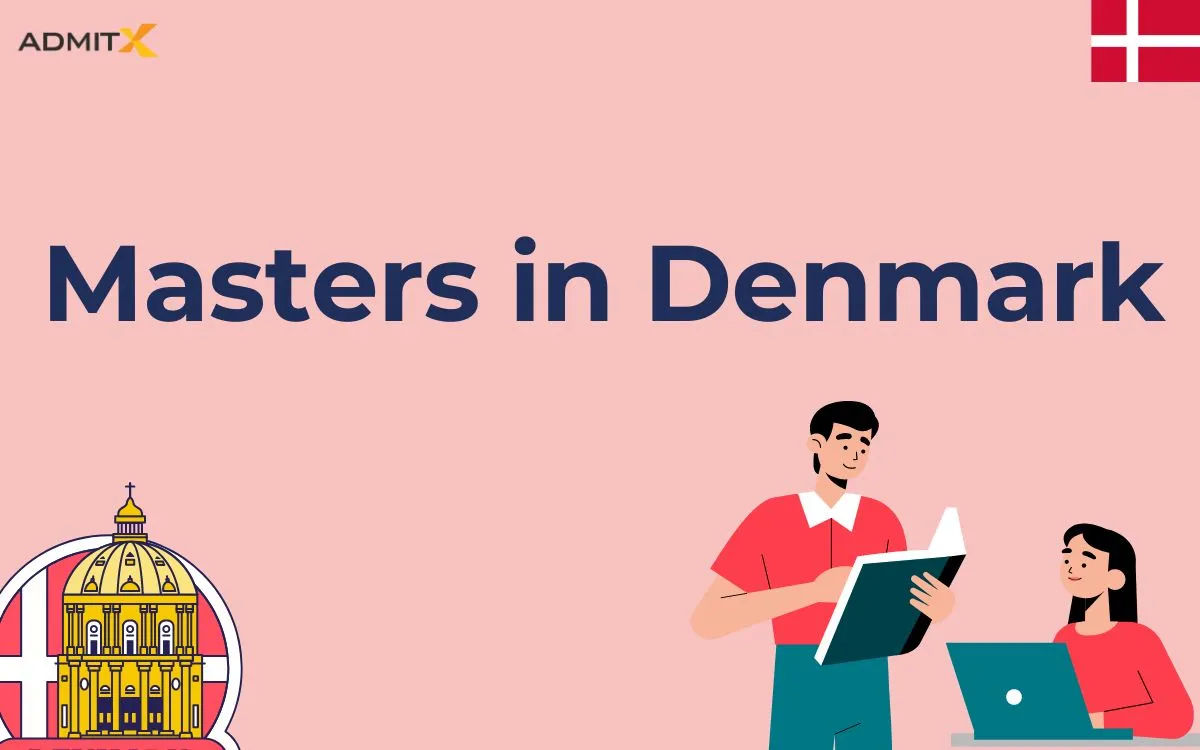
Masters in Denmark: Top Universities, Course & Career
The presence of world-class universities, affordable living, and a peaceful environment gives students lots of opportunities to seek their aspirations in their chosen fields. As per the World Happiness Index, Denmark stood 2nd in the world in the happiness index.
Pursuing a Masters in Denmark brings many advantages to Indian students who look to develop a unique perspective of the world.
- Masters in Denmark: Top Reasons to Study
- Top Universities in Denmark
- Study in Denmark: Popular Masters Courses
- Study Intakes in Denmark
- How to Study in Denmark?
- Documents Checklist
- Study in Denmark: Pre-Application Process for Masters
- Application Process for Masters in Denmark
- Application Deadlines
- Jobs in Denmark for Indian Students
- Student Visa for Denmark
- Post-Study Work Visa for Indian Students
- Cost of Living in Denmark
- Conclusion
- FAQs
Masters in Denmark: Top Reasons to Study
Denmark is a Nordic country located in the south-central part of Northern Europe. The highly reputed education system, the enlightening atmosphere of universities, and the diverse social system bring Indian students a memorable experience.
Let’s discuss some of the key reasons why Indian students prefer to study in Denmark.
1. Affordable Education
For non-EU/EEA students, the tuition fees to pursue MS in Denmark are approximately between 6000 EUR and 18,000 EUR (INR 5 Lakh-16 Lakh), which is low compared to those of bigger European countries like the UK, France, Germany, etc.
2. Supportive Education System
Denmark has the 3rd best education system in the world, which doesn’t place much emphasis on class ranking and tests. Rather, it encourages students to work collaboratively through various innovative approaches.
The government of Denmark invests heavily in making its education system strong and world-class.
3. Access to other parts of Europe
The closer proximity of Denmark to other European counterparts gives students several opportunities for leisure, higher education, and research work during their stay in the country.. It led to the development of wide global perspectives in international students, who wants to think globally.
4. Home to the World’s Renowned Personalities
Denmark is home to the world’s most famous Physicists, Neils Bohr, Hans Christian Andersen, Carl Nelsen, and Lars Ulrich, who have made significant contributions in the fields of Science, Arts and Culture.
5. Safe and Peaceful Environment
Denmark is the world’s second-happiest country. It is also one of the most environmentally friendly countries in the world. Honesty and integrity are the vital parts of day to day lives here. The local community in the country is student-friendly, which often helps international students in the best possible ways.
Top Universities in Denmark
An MS in Denmark is an advanced, research-based course that takes two years. It consists of compulsory courses, elective courses, and thematic courses. It also includes a final dissertation (normally 30-60 ECTS credits) or, in certain subjects, a more practical project. Upon completion of a Masters in Denmark, students are given two options: either they can enter the job market or pursue higher education like PhD. Masters in Denmark is also called Candidatus.
Below, we have tabulated the list of best universities in Denmark along with their QS World Rankings 2024 and annual tuition fees. Tuition fees within a university can vary according to courses and specialisation.
| University | QS World Rankings (2024) | Tuition Fees (Per Year) |
|---|---|---|
| University of Copenhagen | 107 | 74,586-126,779 DKK |
| Technical University of Denmark | 121 | 111,800 DKK |
| Aarhus University | 143 | 59,672-114,123 DKK |
| University of Southern Denmark (SDU) | 326 | 23,123-51,840 DKK |
| Aalborg University | 336 | 26,106-55,942 DKK |
Study in Denmark: Popular Masters Courses
There are approximately 500 English-taught study programmes offered by various top universities in Denmark to international students. Denmark is a hub of research and innovation, which is why Danish universities emphasise strong problem-solving and analytical skills. Be it Science or Commerce, the education system of Denmark encourages students to put forward their endeavours, which can help the world in the long run by solving real problems.
Below are some of the popular courses that most international students opt to study at Danish universities.
- Applied Mathematics
- Biotechnology
- Business Analytics
- Business Management
- Computer Science
- Economics
- Electrical Engineering
- Mechanical Engineering
- Physics
Also read – How to Find the Perfect Study Abroad Program
Study Intakes in Denmark
The academic year in top universities in Denmark begins in July/September every year, which marks the commencement of fall intake. Danish universities offer admissions in most Masters courses in fall intake since it is the primary intake. The application process begins in November and concludes in January of the following year.
Summer intake is also known as secondary intake, and it begins between January to March every year. In this intake, only a few universities provide admission to their short-term and language courses. However, they also provide admission to some selected MS programs.
The application process for the summer intake commences in July and ends in March.
| Intakes | Intake month | Application Cycle |
|---|---|---|
| Winter | July/September | November-January |
| Summer | January/Mid March | July-September |
How to Study in Denmark?
Eligibility Criteria for MS in Denmark
Below are the general guidelines for pursuing a Masters in Denmark. They may vary depending on the course and the university.
International students must have completed a minimum three-year relevant bachelor’s degree/honours degree equivalent to ECTS 180.
Academic Proficiency:
- A minimum CGPA of 6.5 or higher is required.
- If the previous university does not award a CGPA, the minimum GPA of 60-75% is accepted, depending on the program.
- Specific subject-related knowledge and skills, depending on the program, are required.
- Indian applicants can apply for the qualification assessment to determine whether they are eligible for a particular course/program or not.
- Some universities, like the University of Copenhagen, require applicants to undergo pre-assessment before applying for the program in case when they are not eligible for a particular program.
English Proficiency: Indian students applying for masters courses must have the following English language proficiency. English language proficiency may differ from university to university.
- TOEFL iBT: A minimum score of 80-90
- IELTS: A minimum average of 6.5 or equivalent
- Cambridge Proficiency (CPE): C1 or C2
Danish Proficiency: Proficiency in the Danish language is not required for those applicants who are going to pursue a master’s course in the English language.
Also read – Masters Abroad Top Courses Universities
Documents Checklist
The documents required for a Masters in Denmark vary by university, course or program.
However, some standard documents include:
- All Previous Academic Transcripts and documents
- Score certificates for language proficiency tests like TOEFL/IELTS/PTE/Certificate of Proficiency in English (CPE)
- Score certificates for standardised tests like GMAT/GRE, etc. (if required)
- Pre-assessment test certificate
- 2-3 Letters of Recommendation
- 1-2 Statement of Purpose
- CV/Resume
- Work Experience certificate (if required)
- Non-refundable application fee (if applicable)
- Health Insurance
- Criminal background check certificate
Study in Denmark: Pre-Application Process for Masters
- Find top universities in Denmark on the QS World Ranking portal. It provides you with various search filters based on which you can shortlist the best-suited Danish universities for masters.
- Go through their websites to explore all the necessary details, including an overview of the campus, course description, duration, tuition fees, career scopes, specific eligibility criteria, etc.
- Arrange all the required documents.
- Before proceeding with the application portal, check whether you are required to undergo a pre-assessment test conducted by them online.
- If yes, then apply for the pre-assessment test immediately; otherwise, proceed with the main application process.
- Complete the application process by uploading the scanned copy of documents and paying enrollment fees (if required).
- Upon completing the application process, you will get a confirmed email containing the application fee and enrolment receipts.
- Wait for the university’s reply.
Application Process for Masters in Denmark
Unlike other European countries, Denmark has no centralised application portal to apply for Masters courses. Danish universities have portals where international applicants can apply by uploading the required details, digitally scanned copies of documents and application fees (if needed).
Application Deadlines
The application deadlines for masters may depend on the university and course. Generally, the application deadline for summer intake is in October, whereas winter intake is between January and March.
Jobs in Denmark for Indian Students
One of the biggest advantages that international graduates get in Denmark is that right after completing their Masters in Denmark, international students are provided with assistance from the university and government to pursue employment in their desired field.
This includes the granting of work-seeking visas by local authorities and chances to take part in the placement processes conducted by the universities and placement firms.
This gives graduates an opportunity to explore the desired job and employers for which they are passionate and looking about.
After getting a job in Denmark, the employee is entitled to several benefits from the organisation, such as allowances for personal expenses, yearly hike offers, pensions, and loan offers based on their role and performance etc.
The average salary may depend on age, experience, employer, locality, etc.
| Top Industries | Recruiters | Average Salary (Per Year) |
|---|---|---|
| Business & Finance | Danske Bank Mobile Pay Nordea Bec Financial Technologies | 365,000-671,289 DKK (INR 44-81 Lakh) |
| Construction | FLC L&T Intinera Ramboll | 358,910-779,929 DKK (INR 42-94 Lakh) |
| Engineering & Robotics | Vestas Samco Maritime Odense Robotics Beumar Group | 488,551-745,862 DKK (INR 58-90 Lakh) |
| Healthcare Sciences | Leo Pharma Life Science Fyn Novo Nordisk Genmab | 522,103-1,081,500 DKK (INR 63 Lakh-1 Crore) |
| Hospitality | Vila Copenhagen Skt Petri Nimb Hotel Stammershalle Badehotel | 298,344-559,408 DKK (INR 36-67 Lakh) |
Student Visa for Denmark
For study in Denmark, Indian students must apply for a student resident permit up to 6 months before they arrive.
The duration of the study visa is as long as the duration of the academic program. Students can apply for an extension of a study visa of 1 year if, due to any unavoidable circumstances like health issues, pregnancy, etc., the length of the course stretches.
A residence and work permit as a student in Denmark allows their family to live with them in Denmark (only spouse and children under the age of 18).
Application for Student Residence Permit
Indian students must apply for a student resident permit for Denmark as soon as they receive an acceptance letter from the university. Student residence permits grant a stay to international students in Denmark for higher studies that lead to completing a master’s degree.
Application Process
Students can make their application process either online or offline.
The student visa application can be made through the Danish Agency for International Recruitment and Integration (SIRI)
In offline mode, the university will send application forms to students via post, which they must fill out and submit at their nearest Danish Embassy along with the required documents.
In both cases, the biometric details should also be submitted within 14 days of applying.
Application Cost
The application fee or processing fee for the student residence permit is 2,490 DKK or INR 30,098.
Requirements
- Letter of acceptance from the educational institution
- Detailed breakdown of academic program
- Completed ST1 Form
- Application Fee Receipt
- Passport size photograph
- Health Insurance to cover medical and pharmaceutical expenses
- English language requirements
- Passport
- Details of living arrangements in Denmark
- Travel Insurance
- Health Insurance
- Proof of sufficient financial funds to sustain in Denmark (6,243 DKK or INR 76,170 per month).
Post-Study Work Visa for Indian Students
Job Seeking Permit
- After the completion of the study program in Denmark, Indian students can apply for a permit, which extends their stay in Denmark by six months to 3 years, depending on the length and type of course they pursue.
- Generally, a job-seeking permit is granted with a student residence permit so that they can explore and find appropriate career options after the completion of their courses.
- If the job-seeking permit is not granted, then students can apply for it after the course completion.
- After receiving the full-time work offer letter, graduates can apply for a new work and residence permit.
Work Permit
Below, we have listed the types of schemes under which a work permit is issued. The duration of the visa will be the same as the employment duration, after which an application for the extension of the work permit can be made
by Denmark to Indian graduates:
1. Fast Track Scheme
Under the fast track scheme, a work permit is allowed to Indian graduates by government-certified companies that fulfil the minimum wage criteria. Work permits under this scheme are made by the employer with the help of power of attorney given by the applicant. The duration of the visa will be the same as the employment duration, after which an application for the extension of the work permit can be made.
2. Pay Limit Schemes
Work permits under this scheme are issued to those graduates who applied for a job with a salary which is equal to the pay limit amount for the pay limit scheme. The duration of the visa will be 3 years, after which an application for the extension of the work permit can be made.
There are two types of Pay limit schemes:
- The pay limit scheme: The graduate is offered a job in Denmark with a salary of 477,000 DKK or INR 57 Lakh annually.
- The supplementary pay limit scheme: The graduate is offered a job in Denmark with a salary of 393,000 DKK or INR 47 Lakh annually.
3. Positive Lists
Work permits under this scheme are issued to those graduates who applied for a job listed in the professions currently facing a shortage of qualified and skilled professionals. The duration of the visa will be the same as the employment duration, after which an application for the extension of the work permit can be made.
There are two types of positive lists:
- The positive list for people with higher education
- The positive list for skilled work
There are several other schemes under which graduates can obtain work visas and resident permits; they are:
- Researcher
- Employed PhD
- Guest Researcher
- Special individual qualifications
- Herders and farm managers
- Start-up Denmark
- Trainee
- Certification
- ESS Scheme
- Authorisation
- Labour Market Attachment
- Mobile workplaces at sea
- Volunteer
- Sideline employment
- Work permit for spouses/family
Cost of Living in Denmark
An Indian student should make a budget between 4500-5500 DKK or INR 54,000-66,000 per month to maintain living standards. Tuition fees for pursuing courses should also be considered separately.
Below is the table that showcases the general breakdown of the cost of living in Denmark for Indian students.
| Expenses | Estimated Expenses (per month) |
|---|---|
| Accommodation | 3,000-5,000 DKK (INR 36,000-60,000) |
| Food | 1,500-2,000 DKK (INR 18,142-24,189) |
| Transportation | 300 DKK (INR 3000) |
| Amusement/Leisure | 500-1,000 DKK (INR 6,000-12,000) |
| Utilities Bills (Electricity, Water, Phone bills, etc.) | 150-250 DKK (INR 1,800-3,000) |
Conclusion
Pursuing Masters in Denmark offers a wide scope to international students to fulfil their dreams. There are about 500 masters programs run by universities that are taught in English so that international students do not face any problems in understanding the course.
The education system of Denmark is highly efficient and modern, emphasising the development of problem-solving and critical-thinking skills in students.
After completing their MS in Denmark, Indian students don’t have any difficulty finding their dream job since there are abundant schemes under which they can find employment.
FAQs
What benefits does a job-seeking permit give to international students?
Along with providing the stay extension so that international students can find jobs after their studies, it gives them the same part-time work rights as they had during their studies. On average, they are required to work 20 hours per week and full-time through June, July, and August. The hours are calculated per calendar month.
What are the average part-time work rights given to International students?
International students can work up to an average of 20 hours per week and full-time through June, July, and August. The hours are calculated per calendar month.
How long is the duration of studies in Denmark?
Depending on various factors like university, course, specialisation, and level, the average length of pursuing academic courses in Denmark is 3-6 years.
If you are an aspirant looking to study at your dream university, book an appointment with AdmitX today and start your applications early to avail yourself of all the benefits.








